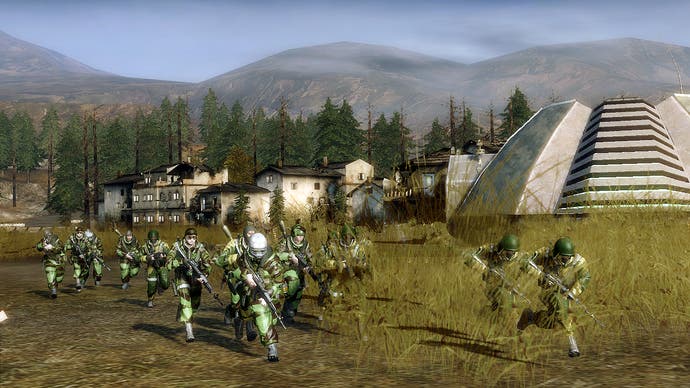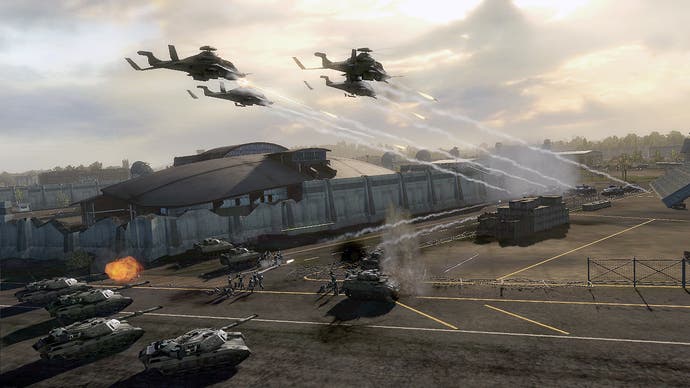Tom Clancy's EndWar
Talking to the TV: now cool.
Many years ago, I owned a computer with a very rudimentary voice-operated word processor on it. I can't remember the name of the particular bit of software, which is probably handy from a legal point of view given what I'm about to say about it, but I do remember that it was a dazzlingly effective piece of technology, so long as what you required was an easy means of taking letters, shopping lists, CVs and college essays, and transforming them into conceptually challenging works of modernist free association. It was a lovely idea, but it didn't work.
Voice recognition has always proved to be dangerous waters, yet that hasn't stopped generations of tech entrepreneurs running themselves aground trying to get it to function properly. With EndWar, it teams up with another troubled enterprise - making an RTS that truly clicks on a console. You'd be forgiven for assuming that the results of such a daring double-endeavour could only be a five-star flaming ambulance pile-up, but a chance to try out the game's multiplayer mode suggests that things are continuing to look surprisingly good.
As the "Tom Clancy's" business should suggest, EndWar's plot is typical neo-con moon pie, a glimpse into a future world where the Middle East has gotten itself blasted into a crater, nuclear weapons have been ruled out of the equation by an orbiting defence network, and dwindling oil reserves have lead Russia, the US, and Europe, rather weirdly, to enter into a massive three-way ballistic rumble. Taken as a whole, it's a story that could have been written by my Nixon-loving great aunt who believed, amongst other things, that the numbers stencilled on the bottom of US road signs were secret instructions for an invading United Nations army, and who once called my sister a Commie when she turned up at the house wearing rainbow-patterned roller-skates. That said, even the dev team admit the back-story's little more than an excuse for a lot of big battles in a vast Atlantic theatre. And it's certainly done the trick: in both the single-player mode and the online multiplayer campaign, the playing field stretches from the Eastern seaboard of the US all the way to Moscow.

And, as previously reported, getting stuck into a few battles, it's immediately obvious that the voice control works. Most of the skirmishes in EndWar revolve around capturing a set number of control points and then hanging onto them during the Defcon period, a tense five-minute countdown where the enemy is suddenly authorised to use WMDs on you and things move from Brutal to Really Nasty. (Alongside this, there are mission variations such as raids, siege scenarios and sabotage challenges.) Limiting commands to a few handfuls of nouns and verbs, and enforcing a rigid sentence structure of Who, What, Where, means that moving units around, getting them to attack or secure structures, combining them into larger teams, bringing in reinforcements, and retreating when, inevitably, the whole thing goes horribly wrong, clicks almost instantly.

There are a few hiccups - your commands have to be phrased in the correct order with "Unit 1, Capture Lima," going down gangbusters, but "Capture Lima, Unit 1," resulting in me being told off by a man with a Russian accent (only in the game, thankfully), but once you've understood the grammar at work, only Yoda is going to have trouble with EndWar's controls. After a mere five minutes of playing, I'd gone from a stuttering clown to a quick-thinking dictator, ordering my units around the map without a second thought. Sure, I was still mostly sending them to face fiery death at the hands of a smarter opponent, but that was hardly the game's fault. Even my limited ability with funny voices, and my unlimited ability with garbling words and stumbling over the simplest sentences, couldn't stump Ubisoft's designers.


